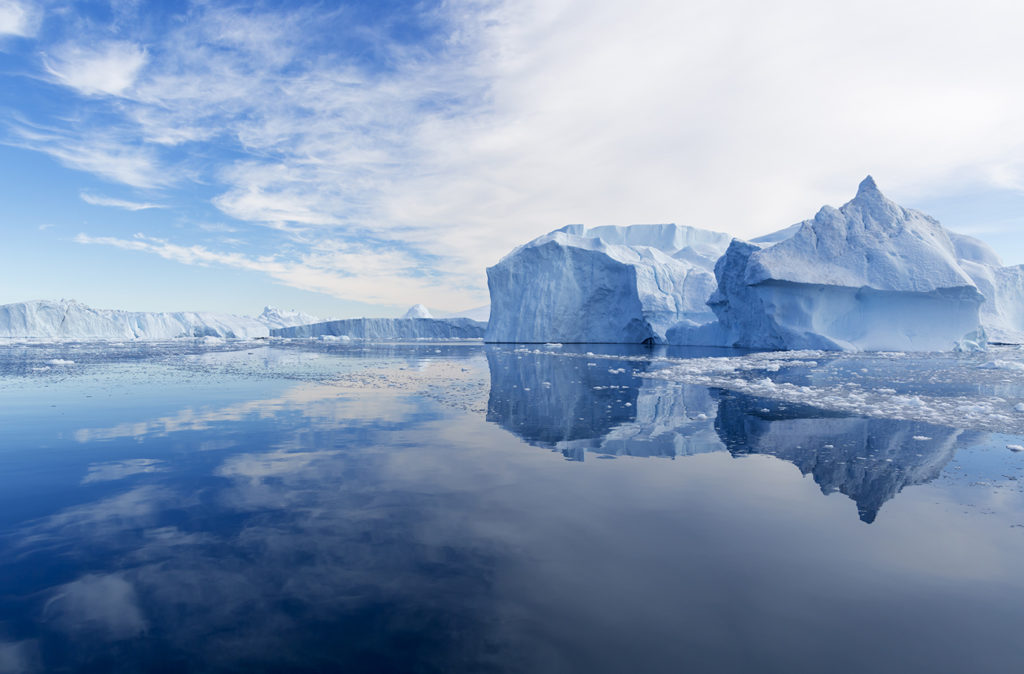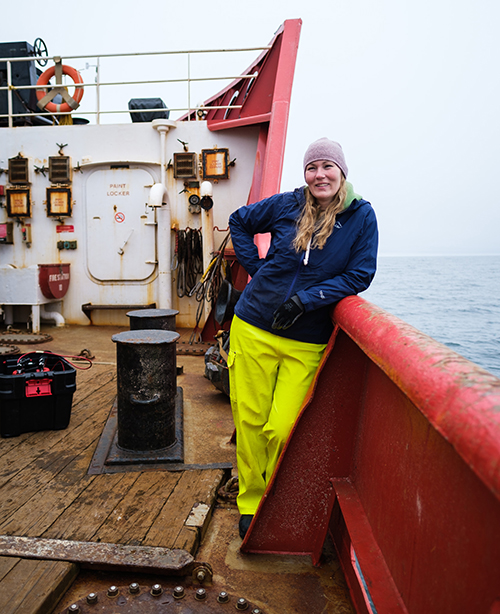In 15th Arctic Report Card, Prof. Karen Frey documents changes impacting base of Arctic’s food web

Climate change continues to disrupt the polar region, with second-highest on record air temperatures and second-lowest on record summer sea-ice driving a cascade of impacts, including the loss of snow and extraordinary wildfires in northern Russia. The National Oceanic and Atmospheric Administration (NOAA) this week released its 15th annual Arctic Report Card, which documents the sustained transformation to a warmer, less frozen, and biologically changed Arctic.
Clark University polar scientist Karen Frey, professor and associate director of the Graduate School of Geography, is among the 133 scientists from 15 countries who contributed to the NOAA report, which was released Dec. 8 during a virtual press conference hosted by the American Geophysical Union, as part of its fall meeting. Frey is the lead author of “Arctic Ocean Primary Productivity: The Response of Marine Algae to Climate Warming and Sea Ice Decline,” which documents an unusually high level of biological activity in the Arctic Ocean this year.

“The vast majority of the Arctic Ocean has experienced clear, long-term trends of warming over the past several decades, leading to declining sea ice and increased marine plant growth,” says Professor Frey. “In 2020, in particular, we saw increases in summertime algae growth in the Laptev Sea north of Siberia — associated with declining sea ice and warming seawater temperatures throughout the region. All of these changes in algae growth have impacts on the entire food web including food security for human populations.”
Highlights of Professor Frey’s research include:
- Satellite estimates of ocean primary productivity — the rate at which marine algae transform dissolved inorganic carbon into organic material — showed higher values for 2020 for seven of the nine investigated regions.
- All Arctic regions have continued to exhibit increased algae growth from 2003 to 2020, with the strongest trends in the Eurasian Arctic, Barents Sea, and Greenland Sea.
- Plankton (chlorophyll-a) in the Laptev Sea of the Eurasian Arctic bloomed at twice the average rate in July, and six times the average rate in August, which is associated with very early loss of sea ice in spring and summer.
A nationally recognized expert on polar ice melt, Professor Frey has served as lead author of the Arctic Ocean Primary Productivity chapter each time it has been included in the Arctic Report Card, beginning in 2011. Throughout her career, Professor Frey, together with her research collaborators, has received funding totaling more than $19 million. In 2019, she received a 5-year, $571,649 grant from the National Science Foundation (NSF) to continue her collaborative research, “The Distributed Biological Observatory (DBO): A Change Detection Array in the Pacific Arctic Region.”
Professor Frey joined the Clark faculty in 2007 and has made frequent research trips to the Arctic with her students. Frey collaborates with undergraduate and graduate researchers in her Polar Science Research Laboratory.
The Arctic Report Card is an annual compilation of original, peer-reviewed environmental observations and analyses of a region undergoing rapid and dramatic alterations to weather, climate, oceanic, and land conditions. The 2020 report card tracks environmental indicators to inform decisions by local, state, and federal leaders confronting a rapidly changing climate and ecosystems.
“For 15 years, the Arctic Report Card has helped NOAA fulfill its mission of providing the scientific information our Nation needs to better understand how climate change is affecting the Arctic and weather around the globe,” says retired Navy Rear Adm. Timothy Gallaudet, Ph.D., deputy undersecretary of commerce for oceans and atmosphere at NOAA. “Our ability to meet the challenges and opportunities of an Arctic region in transition depends on how well we can observe and predict the pace and scale of these changes.”


